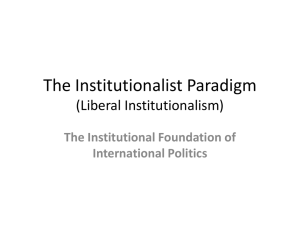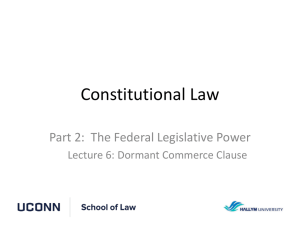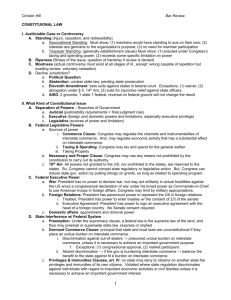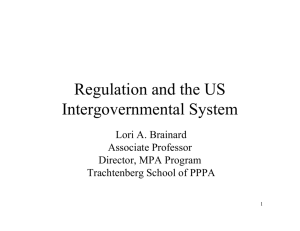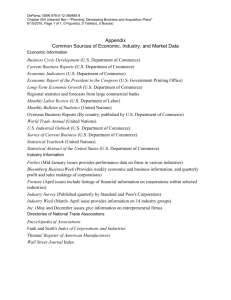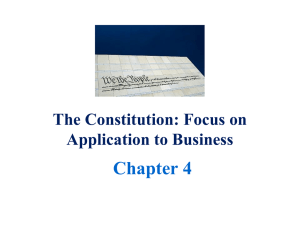Petitioners' Brief on Jurisdiction - Florida State University College of
advertisement
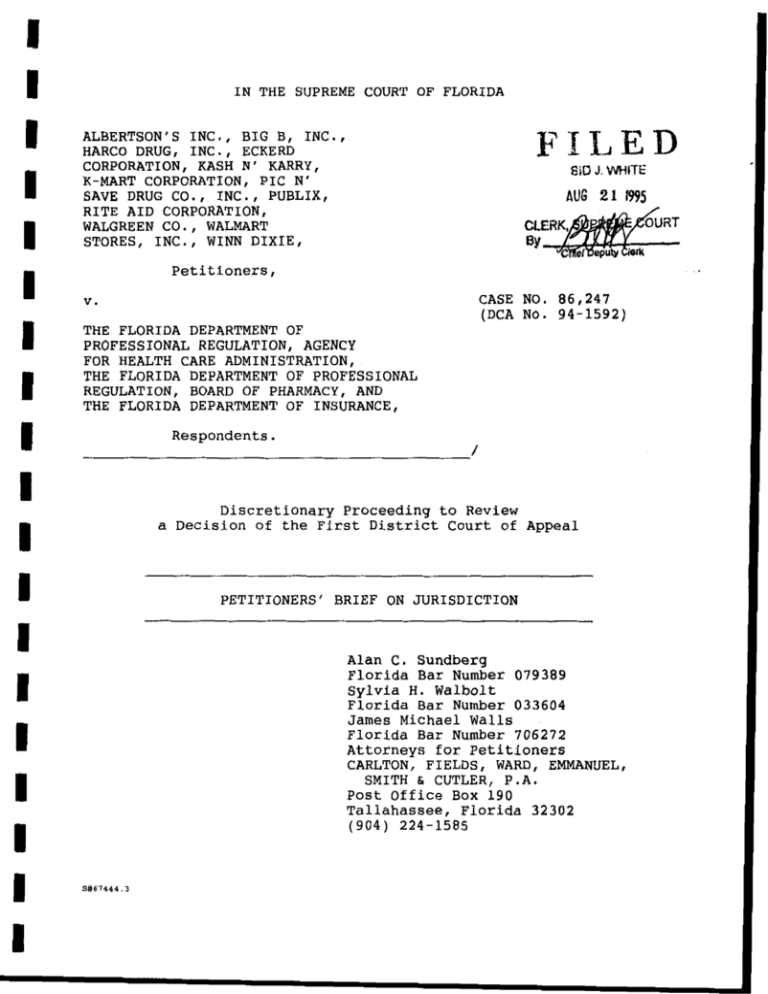
I I I I I I I I I I I I I I I I I I I IN THE SUPREME COURT OF FLORIDA FILED ALBERTSON'S INC., BIG B, INC., HARCO DRUG, INC., ECKERD CORPORATION, KASH N' KARRY, K-MART CORPORATION, PIC N' SAVE DRUG CO., INC., PUBLIX, RITE AID CORPORATION, WALGREEN CO., WALMART STORES, INC., WINN DIXIE, EiD J. W i T E AUE 21 1995 Petitioners, CASE NO. 8 6 , 2 4 7 (DCA No. 94-1592) v. THE FLORIDA DEPARTMENT OF PROFESSIONAL REGULATION, AGENCY FOR HEALTH CARE ADMINISTRATION, THE FLORIDA DEPARTMENT OF PROFESSIONAL REGULATION, BOARD OF PHARMACY, AND THE FLORIDA DEPARTMENT OF INSURANCE, Respondents. / Discretionary Proceeding to Review a Decision of the First District Court of Appeal PETITIONERS' BRIEF ON JURISDICTION Alan C. Sundbesg Florida Bar Number 079389 Sylvia H. Walbolt Florida Bar Number 033604 James Michael Walls Florida Bar Number 706272 Attorneys f o r Petitioners CARLTON, FIELDS, WARD, EMMANUEL, SMITH & CUTLER, P.A. Post Office Box 190 Tallahassee, Florida 32302 ( 9 0 4 ) 224-1585 3#67444.3 I I I I I I I I I I I I I I I I I I TABLE OF CONTENTS Paue PRELIMINARY STATEMENT ................... . . . . . . . SUMMARY OF ARGUMENT . . . . . . . . . . . . . . . . . . . . . ARGUMENT . . . . . . . . . . . . . . . . . . . . . . . . . . CONCLUSION . . . . . . . . . . . . . . . . . . . . . . . . . STATEMENT OF THE CASE AND FACTS CERTIFICATE OF SERVICE ##67444.3 . . m .................... i iii 1 4 5 10 TABLE OF AUTHORITIES PAGE CASES . . . . . . . . . Passim Town of Clarkstown, 114 S. Ct. 1677 (1994) . . . . . . . . . . 6 Associated Industries of Missouri v. Lohman, 114 S. Ct. 1815 (1994) -U.S. C & A Carbone v. 511 U.S. Dean Milk Co. v. Madison, 340 U . S . 349 (1951) . . . . . . . . . . . . . . . . . . .6 Delta Air Lines Inc. v. Dept. of R e v . , 455 S0.2d 317 (Fla. 1984) appeal dismissed, 474 U . S . 892 (1985) . . . . . . . . . . . . . .9 Division of Alcoholic Beveraues and Tobacco v . McKesson C O ~ P . , 524 So.2d 1000 (Fla. 1988), rev'd on other qrounds, McKesson Corp. v. Division of Alcoholic Beveraqes, 4 9 6 U.S. 18 (1990) ....................... Passim Lewis v. BT Investment Manaqers, Inc., 447U.S.27(1980)....., . . . . . . . . . . . . . . 5 Oreqon Waste Systems, Inc. v. Dept. of Env. Qua1itv, U.S. / 114 S. Ct. 1345 (1994) . . rn 6 STATUTES Chap. 93-129, Laws of Florida, Florida Statutes, Sections 408.70-408.706 . . . . . . . . . . . . . . . . iii Florida Statutes Section 408.706(10) S#67444.3 ii .......... Passim PRELIMINARY STATEMENT Petitioners, Albertson's, Inc., Big 13, Inc., Harco Drug, Inc., Eckerd Corporation, Kash n' Karry, K-Mart Corporation, Pic n' Save Drug Co., Inc., Publix, Rite Aid Corporation, Walgreen Co., Walmart Stares, I n c . , and Winn Dixie, were the plaintiffs/appellants below. They will be referred to as "Petitioners." Respondent, The Florida Department of Professional Regulation, Agency for Health Care Administration was the defendant/appellee below. The trial court's final summary judgment, which was adopted by the First District Court of Appeal in its decision, is included in the Appendix at Tab 1. A copy of the decision sought to be reviewed is included in the Appendix at Tab 2 . Where petitioners have referred to the "Supreme Court" in their brief, the references will be to the United States Supreme Court. Where petitioners refer to the "First District" the references will be to the First District Court of Appeal. References to the Florida Supreme Court will be so designated in the brief. The Florida Health Care and Insurance Reform Act of 1993, Chap. 93-129, Laws of Florida (Florida Statutes, Sections 408.70-408.706), will be referred to as "the A c t . 1 1 Unless otherwise indicated, all emphasis in quoted material is added. S#67444.3 iii I I I I I I I I I I I I I I I I I I I STATEMENT OF THE CASE AND F CTS In 1993, the Florida Legislature enacted the Act, adopting a "structured health care competition model" to provide health care benefits to State and small business employees and Medicaid recipients. Community health purchasing alliances ("CHPAs" were created to purchase health care services on behalf of their constituent members. CHPAs purchase health care services through Accountable Health Partnerships ("AHPs"), which meet the health care needs of CHPA members through contracts with various health care providers, including, in the case of prescribed medicine services, pharmacies. In Section 408.706(10) of the Act, the Legislature singled out prescribed medicine services among all health care services and created a discrete market, separate from the AHP contract market for services to CHPA members, in which a certain, narrowly defined group of largely intrastate pharmacies, defined as "independent pharmacies," have direct, unfettered access to CHPA members. Under that provision, any CHPA member may use an "independent pharmacy," even though the AHP providing the member's benefits has a contract for prescription medicines with another pharmacy, if the "independent pharmacy" offers the medicine at or below the contract price negotiated by the AHP. However, not all pharmacies are given this right to compete. Pharmacies "licensed under another state's laws" and pharmacies with "greater than 12 pharmacy facilities in the state" are expressly excluded from the definition of an "independent 9#67444.3 I I I I I I I I I I I I I I I I I I I I pharmacy." Hence, those pharmacies are barred fr M the separate prescribed medicine market created by Section 408.706(10). In short, this provision bars competition in this new market between (1) the "independent" intrastate pharmacies and ( 2 ) all pharmacies that do business in states other than the State of Florida, as well as all pharmacies having more than 12 stores within Florida. The vast majority of the pharmacies that do business both in Florida and in other states operate more than 12 Florida stores, and the disparate burden on interstate commerce created by this statutory numerical bar is clear. Indeed, the "independent pharmacies" benefitted by this limitation are almost entirely intrastate companies 47 total pharmacy companies -- -- 4 2 out 0 while interstate pharmacy companies, representing 87% of the total pharmacies doing business in Florida, are not permitted to compete in the market created by this provision. Thus, the excluded pharmacies cannot fill prescriptions for CHPA members under contract with another pharmacy, no matter how competitive they might be. Yet, if those excluded pharmacies are awarded a contract to serve CHPA members, the favored intrastate pharmacies have a statutory right to Serve those members as well. Petitioners filed an action seeking to declare Section 408.706(10) unconstitutional. judgment. The trial court granted both motions in part and denied them in part. Of Section 408.706(10) S#67444.3 Both parties moved for summary The trial court found that the first part -- which prohibited pharmacies licensed 2 I I I I I I I I I I I I I I I I I I I prescribed medicine market Section 408.706(10) created -- favored in-state pharmacies over out-of-state pharmacies and, hence, amounted to "economic protectionism." As a result, the trial court concluded this measure violated the Commerce Clause and declared that part of the provision invalid. However, with respect to the numerical bar i n Section 408.706(10), the trial court held, without addressing at all the disproportionate impact of that limitation on interstate pharmacies, that it was not "clearly discriminatory." The trial court concluded that: (1) a few intrastate pharmacies were a l s o excluded from the Section 408.706(10) market and, hence, the provision burdened both intrastate and interstate commerce; and ( 2 ) the Act "as a whole" did not discriminate against interstate pharmacies. Petitioners appealed this ruling. In a divided decision, the First District affirmed. The majority adopted the trial court's opinion as its own. The majority agreed that Some burden on intrastate commerce justified any burden on interstate commerce, no matter how severe the burden on interstate commerce might be. The majority also agreed that the statutory framework must be examined "as a whole" to determine if Section 408.706(10) placed an impermissible burden On interstate comerce. The majority sought in this regard to distinguish Associated Industries of Missouri v. Lohman, - U.S. 114 S. Ct. 1815 (1994), stating that it permitted the weighing of the benefit provided in one part of a statutory S#67444.3 3 I I I I I I I I I I I I I I I I I I I scheme against the burdens imposed on interstate commerce in another part of that statutory scheme, in order to determine if the challenged provision violates the Commerce Clause, In dissent, Judge Miner pointed out that the Lohman Court had in fact specifically held that advantages provided interstate companies in part of a statute could not be used to legitimize discrimination against interstate commerce in other parts of the same statute. SUMMARY OF ARGUMENT This Court should exercise its discretionary jurisdiction because the decision by the F i r s t District, which expressly declares valid a statutory provision under the Commerce Clause, also directly conflicts with long established precedent of this Court and the United States Supreme Court. That precedent makes clear that a state's efforts to protect its local commerce will not pass constitutional muster under the Commerce Clause. Simply put, a state may not carve out a particular part of a local market for local business, even if out-of-state businesses can compete with local business in other parts of the market. Similarly, the determination whether unconstitutional discrimination exists is unaffected by the fact that some interstate businesses may be favored, or a few in-state businesses disfavored, by operation of the challenged provision. If local businesses will receive a disprowrtionatelv large share, and out-of-state businesses a smaller share, of the sales 3#67444.3 4 I I in the market by operation of the cha .,enget provision, it is unconstitutional. This Court has always been vigilant in invalidating legislative measures designed to protect local businesses from their out-of-state competitors. It should act in this case to protect the right of interstate business to compete with Florida Ic 4 'I '1 'I 'I 'B 'B 'I 'I I I I I businesses on a level playing field, consistent with t h e teachings of Lohman and other precedent. Otherwise, the First District's decision will Serve as a roadmap for future legislative efforts to discriminate unfairly in favor of local interests Contrary to the Commerce Clause of the United Statea Constitution. ARGUMENT The First District improperly validated Section 408.706(10), despite its discriminatory impact on interstate commerce. Moreover, it did so on grounds which are in direct conflict with decisions of this Court and the Supreme Court on the Same fundamental issues of constitutional law. First, the First District concluded that, because the numerical limitation visited "its effect on bath interstate and local business," the provision survived constitutional scrutiny, However, as Judge Miner correctly pointed out, the decision in Lewis v. BT Investment Manaqers, Inc., 4 4 7 U.S. 2 7 (1980), relied upon by the majority, does not support this proposition at all. Instead, the Supreme Court expressly held that "legislation that Visits its effect equally upon both interstate and local business S#6744Q .3 5 may survive constitutional scrutiny if it is narrowly drawn." LewisI 4 4 7 U.S. at 36. C o n t r a r y to the First District's erroneous conclusion, then, legislation is unconstitutional if it provides an unequal or preferential advantage to in-state interests. The Supreme Court has so held in other decisions, declaring that a burden imposed on some in-state companies, or some benefit granted to a few out-of-state companies, does not justify an uneven burden on interstate commerce. See, e.ul, C & A Carbone v. Town of Clarkstown, 114 S. Ct. 1677, 1682 (1994) (ordinance was no less discriminatory because in-state or even in-town trash processors were also prohibited from competing w i t h the favored processor."); Oreqon Waste Systems, Inc. v. Dept. of Env. Quality, 114 S. Ct. 1345, 1350 (1994) (discrimination "simply means differential treatment of in-state and out-of-state economic interests that benefits the former and burdens t h e latter."); Dean Milk Co. v. Madison, 340 U.S. 349, 354 (1951) ("immaterial that Wisconsin milk [processed] from outside the Madison area is subjected to the same proscription as that moving in interstate commerce.'') As . these decisions make clear, and contrary to the Firnt District's decision here, this section cannot be saved merely because a few intrastate pharmacies are barred from, and a few interstate pharmacies are not barred from, competing for the business of individual CHPA members. If its practical effect is to provide a commercial advantage to in-state businesses over S#67444.3 6 virtually all of their out-of-state competitors -- as is the case here -- the statutory provision is invalid under the Commerce Clause. This Court so held in Division of Alcoholic Beverages and Tobacco v . McKesson CorP., 524 So. 2d 1000 (Fla. 1988), rev'd on other srounds, McKesson Corp. v. Division of Alcoholic Beveraaes, 4 9 6 U.S. 18 (1990). There, the Court declared that "the mere fact that not all out-of-state competitors are disadvantaged by a state statute does not preclude a finding that the statute places a discriminatory burden on interstate commerce." Id. at 1007, The Court concluded that the Legislature's clear preferential treatment of beverages made from crops found in Florida rendered the statute unconstitutional. The First District's decision directly conflicts with this Court's decision in McKesson, as well as with Commerce Clause decisions of the Supreme Court cited above. Neither this Court nor the Supreme Court have ever required, as the First District has now done, complete discrimination against interstate commerce in order for a Commerce Clause violation to exist. Instead, a statute violates the Commerce Clause if it has the practical effect of disproportionately favoring local business over out-ofstate business. That, of course, is the exact effect of the numerical limitation in Section 408.706(10). Hence, the First District's decision validating the statutory provision under the Commerce Clause is contrary to the decisions of this Court and the Supreme S#67444.3 7 Court on this important question of constitutional law. This Court should accordingly exercise its jurisdiction to review that decision. This Court should exercise its review jurisdiction here f o r a second important reason. The First District incorrectly held that, even if there is some statutory discrimination against interstate commerce, that is permissible so long as the "Act as a whole" is not discriminatory. Based on its erroneous reading of Lohman, the Court concluded that the discriminatory impact of the numerical limitation in this statutorily created market was constitutionally permissible because the " A c t as a whole" allowed interstate pharmacies to compete with local pharmacies in broader contract market. the In point of fact, the Supreme Court rejected that exact argument in Lohman, declaring "[w]e have never suggested, however, that patent discrimination in part of the operation of [a statutory scheme] ... can be rendered inconsequential f o r Commerce Clause purposes by advantages given to interstate commerce in other facets of [the scheme]" Lohman, 114 S.Ct. at 1822. Thus, as Judge Miner correctly recognized in dissent, the majority's decision directly conflicts with Lohman in holding that courts may consider the statutory scheme as a whole to determine if discrimination exists in a particular, challenged provision. Lohman makes it clear that the Commerce Clause does not sanction this type of economic tradeoff. Rather, if discrimination has occurred in some part of the market as a S#67444.3 8 I I c I result of a statutory provision, that provision is invalid. And, that determination is unaffected by the sum of the advantages and disadvantages afforded out-of-state businesses under the statutory scheme "as a whole." This Court has long been vigilant in its protection of interstate commerce from burdens imposed by the legislature in favor of local interests. See, e.q., McKesson; Delta Air Lines Inc. v. Dept. of Rev., 455 So.2d 317, 320 (Fla. 1984) appeal dismissed, 4 7 4 U.S. 892 (1985) (Commerce Clause demands "substantially evenhanded treatment" of in-state and out-of-state interests). Indeed, as this Court emphasized in McKesson, the tendency of the legislature to favor local businesses is at impermissible odds with the "general principle that the Commerce Clause prohibits a State from using its regulatory power to protect its own citizens from outside competition." Id. at 1008. This Court must remain vigilant and exercise its jurisdiction in this case to ensure that this constitutionally prohibited use of state legislative power does not go unchecked. The importance of such oversight by this Court cannot be overstated. The First District's erroneous and lenient view of the level of discrimination that is permitted against interstate commerce under the Commerce Clause obviously has a potentially far reaching effect. Instead of serving as a steadfast check on the legislature's power to advance the interests of local businesses at the expense of their out-of-state competitors, the 8#67444.3 9 I I majority's decision stands as an open invitation to the future enactment of equally invidious protectionist measures. CONCLUSION At the core of the constitutional prohibition of discrimination against interstate commerce is the framers' intent that there be one single market in these United States. Hence, individual states cannot erect any barrier in an effort to advantage local interests, because that would destroy the fundamental concept of a national market in this country. 4 'I 'I 'I I( 'I 'I 'I I I I I If, then, the Legislature creates a market for the direct purchase of drugs by CHPA members from pharmacies who have not contracted with the AHP, interstate pharmacies must be permitted to compete on a "substantially evenhanded" basis with local, interstate pharmacies in that market. Consistent with its long tradition of protecting the rights of interstate businesses to compete in local markets, this C o u r t should exercise its discretionary jurisdiction and accept this case f o r review. - / . /D 0 L , b Alan C. Sundberg ' Florida Bar Number 079389 Sylvia H. Walbolt Florida Bar No. 033604 J. Michael Walls Florida Bar No. 706272 Attorneys for Petitioners CARLTON, FIELDS, WARD, EMMANUEL, SMITH & CUTLER, P.A. Post Office Box 190 Tallahassee, Florida 32302 (904) 224-1585 10 I I CERTIFICATE OF SERVICE I I I I 5 I HEREBY CERTIFY THAT a true and correct copy of the foregoing has been served by U.S. Mail to Robert Butterworth, Attorney General and Stephanie A . Daniel, Assistant Attorney General of the State of Florida, The Capitol, Tallahassee, St Florida 32399, on this &/-day c 'I 'I 'I 'I 'I 'I I I I I I S#6?444.3 of August, 1995.


